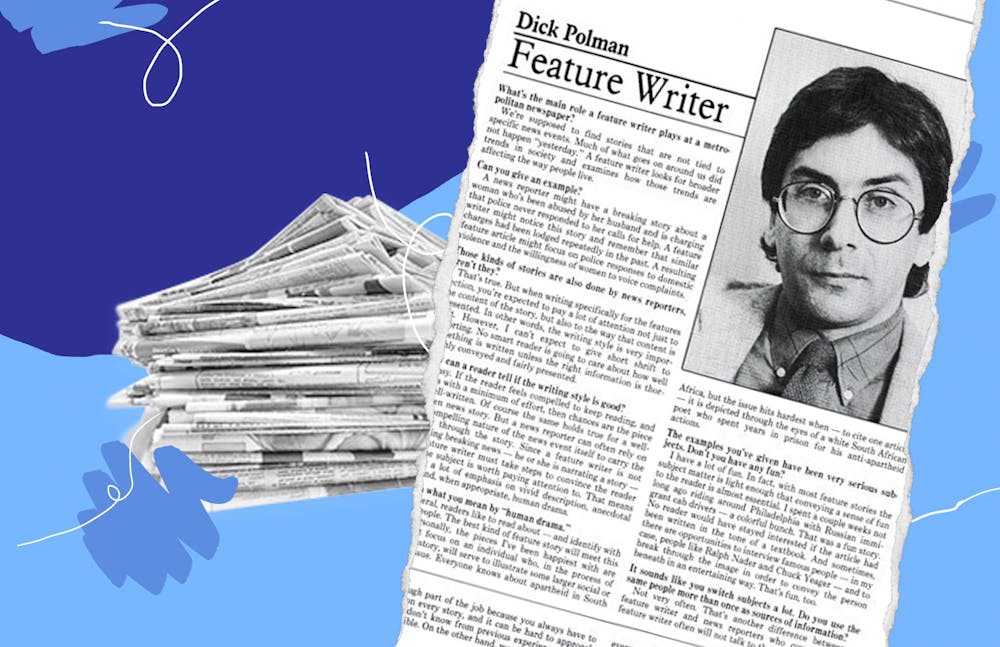“As a journalist, your notebook is your passport to other worlds, to people you would’ve never otherwise met, and to situations you would’ve never otherwise been in…”
Before Dick Polman became a full–time professor at Penn fifteen years ago, he spent over 30 years working as a journalist—his career has taken him to over fourteen countries, many different states and cities, and inside the complicated lives of countless people.
The professor discovered his love for journalism early in life, after working for his college newspaper at George Washington University his sophomore year. His professional career began at The New London Day in 1973, led him to found his own alternative weekly paper called the Hartford Advocate, then took him to writing for the Hartford Courant as a metro columnist for three years. Polman reflects that his day–to–day work was incredibly hands–on. He would spend an entire day with someone to gather content for the piece that he was writing. "One of these articles was about the widow of a cop that had just been killed by a criminal. I’d do a piece like that, or I’d hang out with some guy who was living out of his car to illustrate the homeless problem,” Polman says.
Polman describes how one of his favorite parts of being a journalist is the range of pieces he’s been able to write, and, consequently, the vast array of situations that he’s been thrown into. Many of these experiences came in his 22 years at the Philadelphia Inquirer, where Polman worked as a foreign correspondent in London, a national political writer, a baseball writer covering the Philadelphia Phillies, and more.
His time as a foreign correspondent was his favorite of his career, perhaps because it was the most challenging. “I was responsible for 13 countries, including Ireland, France, Spain, The Netherlands, Sweden, Denmark, Belgium, and others… I was so far outside of my comfort zone, in environments that were completely alien to me… all while trying to write pieces about these people and cultures that would interest an American audience. And what’s also important to remember is that this was in 1992, before the internet.”
Reflecting upon his time abroad, Polman speaks fondly about the sensation that he often felt that he was experiencing something incredible. He recalls a specific piece that he wrote while covering the trial of a French policeman accused of Nazi war crimes: “I love that piece a lot. I think it just invoked the atmosphere of the court room, the stakes involved, and France trying to come to terms with its collaborationist Nazi past. I remember just sitting there and thinking about how amazing it was, and that I couldn’t believe that I was there. I’d get that feeling all the time, while I had that job.”
A close second to Polman's position as a foreign correspondent were the years that he spent covering national politics. As a political writer, Polman parachuted all over the country. The first election that he covered was in 1992—halfway through which he had to fly to London to get his family settled only to fly back to the US to cover the last seven weeks of the election. He wrote about every election for the Inquirer from then until 2006, attending every debate, primary night, and whatever other event that he wanted.
Polman's love for the journalistic lifestyle is born out of his love for unpredictability. “For the vast majority of jobs in society, you clock in in the morning and you’re doing the same thing, or variations of the same thing, every day. In journalism, you can wake up in the morning and all of a sudden, you’re thrown into something that you had no idea you were going to experience two hours earlier. The thought that when you’d woken up that morning something hadn’t even happened yet, and now you’re spending eight or nine hours making sense of it, is great.”
His first love will always be writing his own pieces, which he still does for his own independent column. But his second love, not too far behind, is communicating the craft as a professor to young, aspiring journalists. “I feel like I’m doing my little part to pass along everything that I feel I’ve learned over the years, and maybe to see some of it get kindled in a new generation."
I still remember Professor Polman’s motto from when I myself took his Long–Form Journalism class last semester.
"Journalism is the most fun you can have working hard, and the hardest work you can do having fun."







